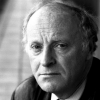The formula for prison is a lack of space counterbalanced by a surplus of time. This is what really bothers you, that you can’t win. Prison is lack of alternatives, and the telescopic predictability of the future is what drives you crazy.
Joseph Brodsky (1940-1996) Russian-American poet, essayist, Nobel laureate, US Poet Laureate [Iosif Aleksandrovič Brodskij]
“Less Than One,” Less Than One: Selected Essays (1986)
(Source)
Quotations by:
Brodsky, Joseph
Now and in the time to be, I think it will pay for you to zero in on being precise with your language. Try to build and treat your vocabulary the way you are to treat your checking account. Pay every attention to it and try to increase your earnings. The purpose here is not to boost your bedroom eloquence or your professional success — although those, too, can be consequences — nor is it to turn you into parlor sophisticates. The purpose is to enable you to articulate yourselves as fully and precisely as possible; in a word, the purpose is your balance.
Joseph Brodsky (1940-1996) Russian-American poet, essayist, Nobel laureate, US Poet Laureate [Iosif Aleksandrovič Brodskij]
“Speech at the Stadium,” Commencement Address, University of Michigan (18 Dec 1988)
(Source)
Now and in the time to be, try to be kind to your parents. If this sounds too close to “Honor thy mother and father” for your comfort, so be it. All I am trying to say is try not to rebel against them, for, in all likelihood, they will die before you do, so you can spare yourselves at least this source of guilt if not of grief. If you must rebel, rebel against those who are not so easily hurt. Parents are too close a target (so, by the way, are sisters, brothers, wives or husbands); the range is such that you can’t miss.
Joseph Brodsky (1940-1996) Russian-American poet, essayist, Nobel laureate, US Poet Laureate [Iosif Aleksandrovič Brodskij]
“Speech at the Stadium,” Commencement Address, University of Michigan (18 Dec 1988)
(Source)
Try not to pay attention to those who will try to make life miserable for you. There will be a lot of those — in the official capacity as well as the self-appointed. Suffer them if you can’t escape them, but once you have steered clear of them, give them the shortest shrift possible.
Joseph Brodsky (1940-1996) Russian-American poet, essayist, Nobel laureate, US Poet Laureate [Iosif Aleksandrovič Brodskij]
“Speech at the Stadium,” Commencement Address, University of Michigan (18 Dec 1988)
(Source)
No matter under what circumstances you leave it, home does not cease to be home. No matter how you lived there — well or poorly.
The surest defense against Evil is extreme individualism, originality of thinking, whimsicality, even — if you will — eccentricity. That is, something that can’t be feigned, faked, imitated; something even a seasoned imposter couldn’t be happy with. Something, in other words, that can’t be shared, like your own skin: not even by a minority. Evil is a sucker for solidity. It always goes for big numbers, for confident granite, for ideological purity, for drilled armies and balanced sheets. Its proclivity for such things has to do with its innate insecurity, but this realization, again, is of small comfort when Evil triumphs.
Joseph Brodsky (1940-1996) Russian-American poet, essayist, Nobel laureate, US Poet Laureate [Iosif Aleksandrovič Brodskij]
Commencement Address, Williams College (24 May 1984)
(Source)
No matter how daring or cautious you may choose to be, in the course of your life you are bound to come into direct physical contact with what’s known as Evil. I mean here not a property of the gothic novel but, to say the least, a palpable social reality that you in no way can control. No amount of good nature or cunning calculations will prevent this encounter. In fact, the more calculating, the more cautious you are, the greater is the likelihood of this rendezvous, the harder its impact. Such is the structure of life that what we regard as Evil is capable of a fairly ubiquitous presence if only because it tends to appear in the guise of good. You never see it crossing your threshold announcing itself: “Hi, I’m Evil!” That, of course, indicates its secondary nature, but the comfort one may derive from this observation gets dulled by its frequency.
Joseph Brodsky (1940-1996) Russian-American poet, essayist, Nobel laureate, US Poet Laureate [Iosif Aleksandrovič Brodskij]
Commencement Address, Williams College (24 May 1984)
(Source)
If the first blow hasn’t knocked all the wits out of the victim’s head, he may realize that turning the other cheek amounts to manipulation of the offender’s sense of guilt, not to speak of his karma. The moral victory itself may not be so moral after all, not only because suffering often has a narcissistic aspect to it, but also because it renders the victim superior, that is, better than his enemy. Yet no matter how evil your enemy is, the crucial thing is that he is human; and although incapable of loving another like ourselves, we nonetheless know that evil takes root when one man starts to think that he is better than another.
Joseph Brodsky (1940-1996) Russian-American poet, essayist, Nobel laureate, US Poet Laureate [Iosif Aleksandrovič Brodskij]
Commencement Address, Williams College (24 May 1984)
(Source)
There are worse crimes than burning books. One of them is not reading them.

